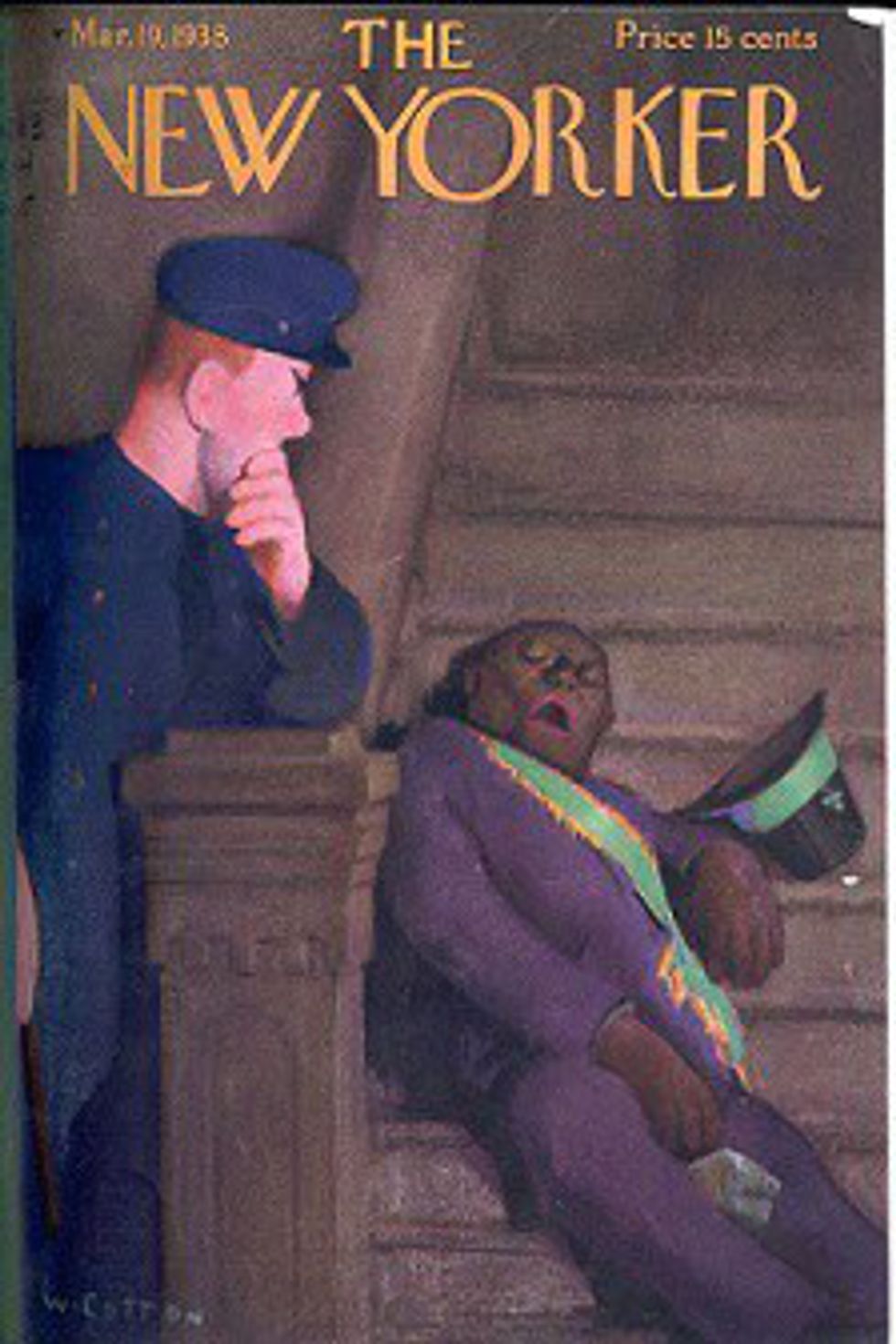I don’t even know where to start. I guess I should start off by saying that I hope the author of this article reads this and finds this as an opportunity to learn versus perceiving this as a personal attack—or even an attack on White people as a whole.
There are so many things fundamentally incorrect, starting with the title, "Why White Privilege Is As Racist As It Sounds," but I’ll get into this later. Not only does the author not understand what the term "white privilege" means, but the author clearly demonstrates a lack of understanding in regards to critical race theory and even basic United States history.
In this response, I will give a breakdown as to why this entire article is invalid. Throughout this article, you will find links to credible sources, so everyone can see that this information is legitimate and accurate. And to those who do not see it as legitimate, know that you’ve chosen to not see it as that.
In the first paragraph, the author claims that "the term 'white privilege' was coined: out of nothing." Contrary to what the author might believe, the term “white privilege” did not come from “nothing.” The origins of the concept of White privilege go all the way back to 1935. During the 1930s in the United States, there continued to be a large presence of racism, discrimination and segregation despite the abolition of slavery in 1865.
For example, this cover for the New Yorker from March 19, 1938, overexaggerates the features of the African American male who appears to be drunk while being scolded by a White officer, obviously in a position of power. By Beverly Daniel Tatum’s definition, this image is considered cultural racism, which is the idea that “the cultural images and messages that affirm the assumed superiority of Whites and the assumed inferiority of people of color.”
In W.E.B. Du Bois’ "Black Reconstruction In America," written in 1935, Du Bois (an American sociologist and social reformer) wrote about a “psychological wage” White laborers were compensated for, but not the Black laborers simply because they were Black.
“It must be remembered that the white group of laborers, while they received a low wage, were compensated in part by a sort of public and psychological wage. They were given public deference and titles of courtesy because they were white. They were admitted freely with all classes of white people to public functions, public parks, and the best schools. The police were drawn from their ranks, and the courts, dependent on their votes, treated them with such leniency as to encourage lawlessness. Their vote selected public officials, and while this had small effect upon the economic situation, it had great effect upon their personal treatment and the deference shown them. White schoolhouses were the best in the community, and conspicuously placed, and they cost anywhere from twice to ten times as much per capita as the colored schools. The newspapers specialized on news that flattered the poor whites and almost utterly ignored the Negro except in crime and ridicule.”
After Du Bois wrote of the “psychological wage” that benefits White people in the United States, in 1965, during the Civil Rights Movement, Theodore W. Allen began his analysis of “White skin privilege.” But the concept of "White privilege" became popular in the 1980s by Peggy McIntosh in "White Privilege and Male Privilege: A Personal Account of Coming to See Correspondences Through Work in Women’s Studies." In this paper, McIntosh names 46 examples of White privilege. For example,
“2. I can avoid spending time with people whom I was trained to mistrust and who have learned to mistrust my kind or me.
[….]
15. I did not have to educate our children to be aware of systemic racism for their own daily physical protection.”
So, in fact, the term "white privilege" wasn't simply “coined out of nothing.” It's a result of the racist structure that the United States was founded on. For nearly 400 years, since Christopher Columbus arrived in Cuba in 1492 until the abolition of slavery and even after, the United States benefitted from basically free or extremely cheap labor on the backs and bones of people of color. I should also mention that these centuries of oppression have resulted in institutionalized racism and structural oppression that hinder people of color.
In the third paragraph, the author says, “Well here's a not-so-shocking revelation: Hardships and struggles do not care what color we are.” What's being misunderstood here is that when someone says “White privilege,” people tend to hear, “white people can’t or don’t struggle because they are White.” However, when someone uses the term “White privilege,” they are referring to the ways in which institutionalized racism and structural oppression protect White supremacy, and therefore White people.
Throughout the author’s whole article, there is a clear absence of how social constructs like sexism, ableism, heteronormativity, and in this particular case, how racism has affected and become apart of our social, political and economic institutions. To be able to see this, it's important to look at racial and ethnic disparities in education, poverty and political representation.
The United States Census Bureau reported on the poverty rates by race and Hispanic or Latino origin from 2007 to 2011.
The percentage of White people below the poverty line was 11.3 percent in comparison to the percentage of Native Americans (27.0 percent), African Americans (25.8 percent), Latinxs/Hispanics (23.3 percent), and Native Hawaiians and Other Pacific Islanders (17.6 percent). Aside from Native Hawaiians and Other Pacific Islanders, people of color are twice or more likely to be under the poverty line.
In May 2015, the National Center for Education Statistics updated the percentage of students enrolled in public elementary and secondary schools, by race/ethnicity in Fall 2002, fall 2012, and a projected fall 2024.
Despite the expected decrease in the percentage of White students, there are still nearly twice as many White students in public elementary and secondary schools. And for those students of color that are in the educational system, they are disproportionately reprimanded in comparison to White students. Check out Policing Chicago Public Schools and their data on how the Chicago Public School system supports the school-to-prison pipeline.
In January 2015, The Washington Post wrote an article on the 114th Congress and its lack of diversity.
This graph demonstrates clearly how large the disparity is between race and ethnicities in political representation. And this disparity persists even amongst news and media representation. Just this past year, the Oscars were criticized for their lack of diversity with the hashtag #OscarsSoWhite. It's also important to be aware of how people of color are being represented when it comes to news and the media. What message are people receiving from these images? What are they trying to say about people of color? These questions are important to keep in mind when talking about White privilege in regards to representation.
Because racism is institutionalized, the graphs I’ve presented show how people of color are disproportionately affected by poverty, lack of education and representation. Granted, there are other social constructs like sexism and classism that also factor in. To put it frankly, White people got a 400-year head start on economic, political and educational development, but this isn't to say that White people can never be below the poverty line ever, or that White people can never be uneducated. But, again, because of the social structures in our institutions, people of color are not presented the same opportunities as White people. That is a fact.
In the fourth paragraph, the author attempts to use the definition of racism in order to explain that White privilege is a form of racism, because all White people have been given an “attribute” and, had an entire “minority” been assigned an “attribute,” it would be “racist.” The definition that the author used of racism was:
(Noun) - the belief that all members of each race possess characteristics or abilities specific to that race, especially so as to distinguish it as inferior or superior to another race or races.
Firstly, the “attribute” that the author is referring to is privilege. Privilege cannot be given; it is a state of being. I have already explained the hierarchies that benefit all White people regardless of socioeconomic status, like institutionalized racism, etc. But the author has missed out on the key part of this definition: "inferior or superior to another race or races." There is an obvious power structure that goes along with racism. For example, all throughout history, White people, but specifically White men, have had an assumed superiority over people of color. The power structure of racism, also known as White supremacy, is what allows White privilege to exist.
In the authors’ fifth, sixth, and seventh paragraphs, they attempt to suggest that reverse racism is real by stating,
“But what about not having to be afraid of police officers? Maybe I just didn't break the law or, on the other hand, I get pulled over by a police officer whose racism is geared toward white people. Yes, they do exist.”
Reverse racism is impossible because of the power structure that I previously mentioned. Again, it’s shown all throughout our history and even in the present-day how this power structure persists. I recommend watching this two-minute video on why "Reverse Racism" Is A Giant Lie.
One part that particularly stuck out to me was when the author stated.
“At the same time, however, there are some "privileges" that are said to be exclusively for whites that aren't true. Just because I can get into school or I can get a job, doesn't mean that I'm having it all handed to me or that it's even a guarantee. I'm also not stopping anyone else from working hard and getting to the exact place I can get to.”
This is a common argument that people have when discussing White privilege. What people need to realize is that when you tell a person of color that they need to “work harder” and that they get everything “handed to them,” what you're really saying is that people of color are "lazy” and “moochers,” all while completely disregarding the institutionalized racism and structural oppression that has and continues to benefit and protect White people the second they are out of the womb. Like I said before, White people got a 400-year head start on fundamental opportunities for development.
Basically, the author lacked an immense amount of information that plays a critical role in what White privilege is, and I hope they can read this and self-reflect, and maybe one day, agree. People, at a certain point, have a responsibility to educate themselves. There are so many mediums that give us the opportunity to learn about things that we previously had never been taught through formal education. Push yourself and take these opportunities.
One thing I can commend the author for? They tried.
Recommended: Explaining White Privilege to a Broke White Person

























